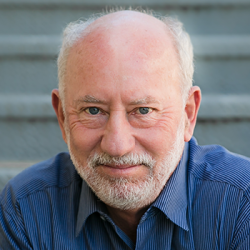
From 1999 to 2003, more knowledge was created than in all the previous years of human history combined. How’s that for a fun fact – and a powerful message about how education needs to adapt to modern times? Linda Darling-Hammond made that point to open her remarks here at PBL World 2018. Schools can’t simply transmit knowledge; we need to be “preparing young people to work with knowledge that hasn’t been discovered yet using technology that hasn’t been invented yet.”
She noted the scale and complexity of the problems the world faces in this century and said, “Students are going to need critical thinking, problem-solving, resourcefulness, grit and determination and goal orientation. And this is what Project Based Learning, geared to high standards, is all about.”
Linda spoke today to over 1200 people in the gym here at American Canyon High School in the Napa Valley, California, gathered for the seventh annual PBL World conference. She was introduced by Buck Institute Executive Director Bob Lenz, who offered an appreciation for her openness to meeting with him in 1998 when he wanted to start the Envision Schools network of small high schools focused on PBL and performance assessment.
Linda noted that students at Envision schools, almost all of whom are low-income minority students, have college graduation rates almost double the national average. In interviews with graduates, she found what made the difference was their ability to investigate, use inquiry, be resourceful, express and debate ideas, and see perspectives—all of which PBL helps teach.
These six principles from the science of learning help explain why PBL is so important for deeper learning, Linda explained:
1. The brain is malleable. Rich experiences cause neurons to grow and synapses to form in our brain. In a classic experiment, rats raised in an environment rich with experiences were compared with rats raised in a very plain environment. The former “got smarter—better able to solve problems, less likely to get discouraged when they ran into an obstacle.”
2. People learn through conversation and interaction with others. A recently released Harvard study confirmed what the famous psychologist Lev Vygotsky said: We actually learn and think more deeply by talking, by expressing our views. This is seen in classrooms when students are engaged in group work, Socratic Seminars, discussions, and exhibitions where they present their ideas and get feedback.
3. Emotion and learning and completely interrelated. Interest, positive emotions, concern for others and liking the teacher all excite the brain and motivate us to learn more effectively.
4. Deep engagement and curiosity, looking at evidence, and reflecting all build the brain and promote deeper understanding. Students who get to experiment and investigate and conjecture before they get information from a book or a lecture actually learn more. Humans are an inquiring species; everything we’ve developed came about by someone thinking, “Hmm, I wonder what will happen if…”? Everything we have accomplished is because of inquiry, curiosity and investigation, and the skill to notice what happens when we try something, to collect evidence and data and figure out how to put it together and make something of it.
5. Feedback and reflection have a huge impact on growth and learning. Research on formative assessment shows that if students get information (not a grade!) about what they have accomplished and what they need to do to improve their performance, and are able to apply that feedback, the gains in achievement are larger than almost any other intervention in the classroom. This also allows students to develop a growth mindset, the competence and confidence needed to achieve a goal.
6. Learning and achievement are tightly tied to developing an identity. Project Based Learning provides opportunities for students to identify themselves as a writer, a mathematician, a researcher, an advocate for social justice, and so on.
As we make our way out of the No Child Left Behind “test and punish era,” Linda concluded, to “an era of meaningful education, the work you are undertaking in fact requires itself grit and tenacity on your part.” She encouraged teachers to develop the sense of passion, experimentation, collaboration, feedback and reflection and growth mindset that students gain in PBL.

